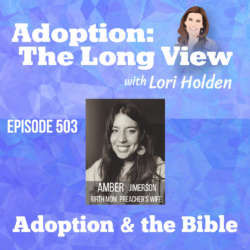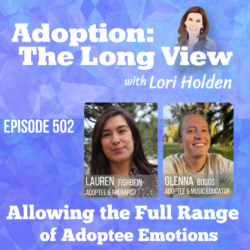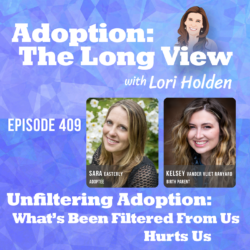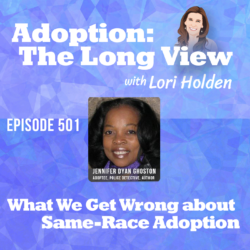Have you ever wondered how to be a more adoption-competent or trauma-informed parent? Today’s guest, adoptive mom Adi Tilford, shares with you how she works to be a therapeutic parent and create for her children a therapeutic home. She has 3 questions that can get you thinking along the same lines.

Adi Tilford on Therapeutic Parenting
The evening started out like most: kids playing, and a feeling of weekend welcome enveloping the house.

Then our usual babysitter cancelled, cascading our children into chaos. Tired, my husband and I canceled our outing. Instead, we used our COVID date-night trick: the children watched a movie in one room, we had dinner outside and joined them after dinner.
As bedtime approached, one of our children became dysregulated. The child’s concern — ill-timed, unexpected, yet familiar to us — had the potential to escalate into fight or freeze or flight, any of which would shut down communication and connection entirely. In the past I might have spent the night arguing, ignoring or lecturing, locked in an unwinnable battle, failing to read the underlying need.
This time, though, I got intentional about being a therapeutic parent.
What is Therapeutic Parenting?
Therapeutic parenting is a deeply nurturing parenting style, and is especially effective for children with attachment difficulties and those who have experienced trauma.1 This includes trauma resulting from separation of newborn from mother, now recognized by research coming from the field of neuroscience.
I have been incorporating concepts of therapeutic parenting for many years. I have not done this work in isolation, but have had a team of attachment and adoption-competent professionals walk with my family in this journey of love. By living out intentional therapeutic parenting practices, our home has become a place I love to be.
Here are 3 questions to consider as you begin or continue your quest as a therapeutic parent.
1. Do my children feel safe?
Felt safety is the emotional and physical feeling of being safe.2 A child can be physically safe, but in a state of dysregulation in which they do not FEEL safe. We can begin to wonder what is causing a child to feel unsafe in the midst of a safe space.
What does their behavior communicate? Is there a trigger from the past that continues to come up? Are parents’ underlying emotions — like annoyance or irritation — igniting a fear response?
Getting clued in on your child’s triggers and building awareness of your own emotional states and responses can help create spaces that do not activate fear.
2. Am I in a learner stance?
Understanding trauma and its complex effects takes time, heart capacity, and patience. In addition to the multitude of resources available for learning about trauma, we can embed one beautiful statement into our daily existence: I wonder…
Curiosity has opened up many healing conversations in our home. When our children are the most dysregulated and we are trying to make connections between early life trauma and immediate behavior, we can offer up “I wonder” without judgment or feelings of shame: I wonder if you’re thinking about …. or I wonder if you are feeling sad [mad/frustrated/left out…].
The child can take it or leave it, but when they take it, curiosity creates capacity for both parent and child to heal.
3. Have I gone there first?
I love therapy. During a counseling session, I often feel discomfort and dysregulation as I work through my own trauma history, losses, and triggers. When I am finished with a therapy session I feel seen, heard, valued, and safe — I’ve worked it out. When internal challenges disrupt our home life, I want my children to feel seen, heard, valued, and safe – I want them to have that worked-it-out feeling.
We often want to put our children in therapy without addressing our own unmet needs. If my child goes to therapy but I can’t stay regulated in our home, then the work with a therapist does little good. Because of my own therapy, I am aware of many of my triggers and I have strategies to use when I don’t feel safe or get triggered for some reason.
Because I have gone before them, when my children begin to struggle, I have the capacity to help with their struggles. I offer presence instead of trying to fix all the problems.
We can only offer what we ourselves have to give. “Only emotionally nourished adults can sustain an affirming, emotionally nourishing environment for children,” says William C. Page, When we go there first, we can live out what being a nourished adult means.
What Therapeutic Parenting Can Look Like
The night my child began to lament her painful feelings, I could have argued or shut her down, but instead I chose to parent therapeutically.
I checked my capacity. Thoughts? Feelings? Needs? I felt secure, so I entered her space. Next, I found the special object that I know will help her feel safe and I placed it in my lap. I offered a back rub, but waited for her consent. When she hid under a blanket I used a gentle game of hide and seek to build connection.
When I sensed she was ready, I offered an “I wonder…“: I wonder if you are thinking about your story? Then I specifically named the connection I was wondering about. I let her lead, knowing she might not want to share. It was okay with me if she didn’t share. I made space for her concerns and hard questions. Eventually she was in my lap, opening up about her hurts and her questions.
I didn’t start out that night planning for this intense conversation, but I was ready to handle it. Earlier that night, I had created capacity by having dinner with my husband in the other room. I managed my disappointment around our canceled date and found a way to care for my needs. My own therapy sessions and self-care routines helped maintain the emotional space I needed for the therapeutic work in our home.
By the end of our time together, my child was regulated. She fell asleep easily. The healing she experienced that night radiated the rest of the weekend as she played.
Co-Regulation is Key
Dysregulation is a part of human existence. Co-regulation helps us know that we don’t have to tackle the hardest parts of life alone.
Therapeutic parenting is a commitment to co-regulation in our parent-child relationships. It builds resilience that will empower our children into adulthood. By embracing the need to create felt safety, taking a learner stance, and doing our work first, we can celebrate our homes being places we truly love to be.
More on Adi Tilford
Adi Tilford is an adoptive mom, educator, writer and speaker. She lives in Western Colorado with her husband, two daughters, and two dogs, where she loves to play in the desert wilderness with her people.
Adi’s growth in therapeutic parenting and service in public education have led her to a new adventure in advocacy. She is writing and speaking about the therapeutic love of Jesus, the in-the-trenches experiences of becoming a therapeutic parent, and educator and her journey of healing as a survivor of early life trauma.
Notes on Therapeutic Parenting
1 Naish, S. (2018). The A-Z of Therapeutic Parenting: Strategies and Solutions. Jessica Kingsley Publishers.
2 Purvis, K. B., Cross, D. R., & Sunshine, W. L. (2007). The Connected Child: Bring hope and Healing to Your Adoptive Family, McGraw-Hill.
See Also
- Karyn Purvis Institute of Child Development
- Post Institute
- What an Adoption-Competent Therapist Thinks You Need to Know (podcast episode)
- Adoptee & Therapist Lesli Johnson, LMFT, on the Neuroscience of Adoption (podcast episode)
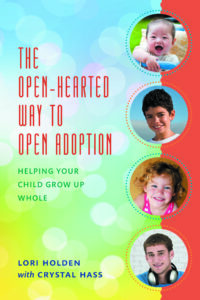
Lori Holden, mom of a young adult daughter and a young adult son, writes from Denver. She was honored as an Angel in Adoption® by the Congressional Coalition on Adoption Institute.
Her first book, The Open-Hearted Way to Open Adoption: Helping Your Child Grow Up Whole, makes a thoughtful anytime gift for the adoptive families in your life. Her second book, Standing Room Only: How to Be THAT Yoga Teacher is now available in paperback, and her third book, Adoption Unfiltered, is now available through your favorite bookseller!
Find Lori’s books on her Amazon Author page and catch episodes of Adoption: The Long View wherever you get your podcasts.


